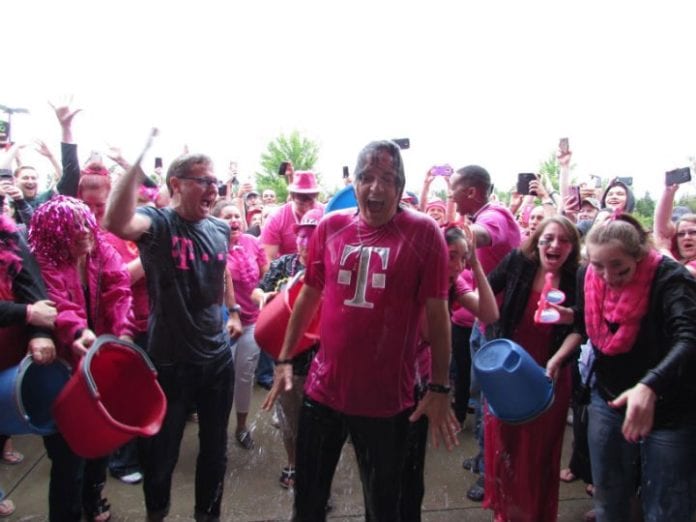The FCC said T-Mobile is on the hook for $48 million in fines and compensation tied to its policy of throttling data speeds for unlimited data customers
The increasingly common industry practice of throttling data speeds for consumers on “unlimited” plans should they attempt to access services from a congested cell tower while being over an arbitrary data amount is set to cost T-Mobile US $48 million.
The Federal Communications Commission said it reached an agreement with the carrier to “resolve an investigation” into claims the carrier did not adequately inform unlimited data customers of those speed and data restrictions. The claim is connected with consumers on both the carrier’s branded service as well as its MetroPCS prepaid brand.
The FCC cited its 2010 Open Internet transparency rules, which require broadband internet providers to “give accurate and sufficient information to consumers about their internet services so consumers can make informed choices.” An FCC statement on the settlement appeared to indicate a positive response from the carrier.
“Consumers should not have to guess whether so-called ‘unlimited’ data plans contain key restrictions, like speed constraints, data caps and other material limitations,” said FCC Enforcement Bureau Chief Travis LeBlanc, in a statement on the settlement. “When broadband providers are accurate, honest and upfront in their ads and disclosures, consumers aren’t surprised and they get what they’ve paid for. With today’s settlement, T-Mobile has stepped up to the plate to ensure that its customers have the full information they need to decide whether ‘unlimited’ data plans are right for them.”
As part of the settlement, T-Mobile US is to pay a $7.5 million fine and provide $35.5 million in “consumer benefits” to those with impacted plans in the form of 20% off of accessories and four gigabytes of additional data. The carrier also is on the hook to provide at least $5 million in services and equipment to schools “to bridge the homework gap facing today’s students,” with the program to begin in October 2017, and to enroll up to 80,000 students over a four-year period.
In terms of adjusting its practices, T-Mobile US is expected to update its disclosures in regards to the possibility of throttling data speeds for unlimited data customers; discontinue the use of the term “unlimited” in describing those plans; exclude “unlimited” data plan customers from its policy of limiting speeds for its highest data users; or limit any speed reductions for “unlimited” data plan customers to the minimum speed advertised for that plan.
T-Mobile US CEO John Legere, who has pushed a strong consumer-first image, noted via his Twitter page “good settlement with the FCC today. [T-Mobile] believes more info is best for customers,” and “glad we could help schools with this solution as well.”
T-Mobile US recently made unlimited services its main focus with the launch of its “One” rate plans. The plans, which were announced as part of its “Un-carrier 12” event, continue to tout “unlimited” LTE data as part of the offering, though in small print adds “on all plans, during congestion the top 3% of data users (>26 GB/month) may notice reduced speeds until next bill cycle.”
T-Mobile US earlier this year adjusted the cap on its threat to throttle data speeds for unlimited customers to the current 26 GB amount, having periodically raised the amount to coincide with increased data usage by customers.
AT&T Mobility and Sprint, which also continue to offer unlimited data packages to consumers, also reserve the right to limit data speeds for customers surpassing a certain allotment and attempting to access data services from a congested cell site. AT&T Mobility currently has a 22 GB soft cap, while Sprint’s is set at 23 GB.
AT&T recently won a court decision regarding a proposed $100 million fine against the telecom operator for its data throttling policy. The U.S. Court of Appeals for the Ninth Circuit overturned a district court’s decision preventing AT&T from having the case thrown out due to a lack of authority by the Federal Trade Commission in the matter. The appeals court sided with AT&T’s claims that it operates as a common carrier and thus is not subject to “the acts to regulate commerce,” which is the realm of the FTC.
The case was initiated in late 2014, when the FTC filed a court complaint alleging AT&T Mobility did not adequately inform customers on unlimited data plans that they would have their data speeds reduced once they reached a certain amount of data used. The FTC noted AT&T Mobility’s move in 2011 to begin throttling data speeds for unlimited data customers once they hit 2 GB of usage per month, “often resulting in speed reductions of 80% to 90% for affected users.”
Bored? Why not follow me on Twitter

